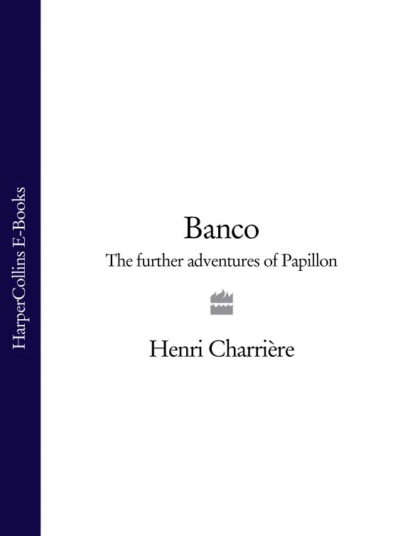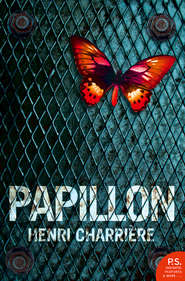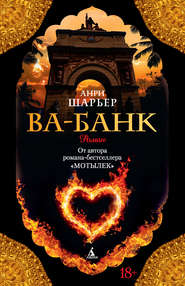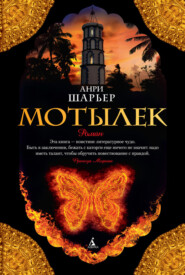По всем вопросам обращайтесь на: info@litportal.ru
(©) 2003-2025.
✖
Banco: The Further Adventures of Papillon
Настройки чтения
Размер шрифта
Высота строк
Поля
‘A good way off. A good way off in the bush. A good many days on a mule and then in a canoe and then on foot, carrying your gear.’
‘It’s not what you’d call in the bag; hardly child’s play.’
“Well, Papillon, it’s the only way of getting hold of a fat sack of dough. You find just one bomb and there you are, a wealthy man – a man who has women that smoke and fart in silk. Or, if you like it that way, a man who can afford to go and present his bill.’
Now he was in full flow; his eyes blazed; he was all worked up and full of fire. A bomb, he told me – and I’d already heard it at the mine – was a little mound no bigger than a peasant’s handkerchief, a mound where by some mystery of nature a hundred, two hundred, five hundred, even a thousand carats of diamonds were clustered together. If a prospector found a bomb in some far-off hole, it didn’t take long – presently men started coming in from north, south, east and west, as if they’d been told by some grapevine. A dozen, then a hundred, then a thousand. They smelt the gold or the diamonds like a starving dog smells a bone or an old bit of meat. They came flooding in from every point of the compass. Rough types with no trade who’d had enough of battering away with a pick at twelve bolivars a day for some employer. They got sick of it, and then they heard the call of the jungle. They didn’t want their family to go on living in a rabbit-hutch, so they went off, knowing very well what they were in for – they were going to work from one sun to the next in a wicked climate and a wicked atmosphere, condemning themselves to several years of hell. But with what they sent home, their wife would have a light, roomy little house; the children would be properly fed and clothed and they’d go to school – even go on with their own schooling, perhaps.
‘So that’s what a bomb gives?’
‘Don’t talk balls, Papillon. The guy that finds a bomb never goes back to mining. He’s rich for the rest of his life, unless he goes so crazy with joy that he feeds his mule with hundred-bolivar notes soaked in kummel or anis. No, the man I’m talking about, the ordinary guy, he finds a few little diamonds every day, even though they may be very, very small. But even that means ten or fifteen times what he gets in the town. Then again, he lives as hard as possible, right down to bed-rock; because out there you pay for everything in gold or diamonds. But if he lives hard, he can still keep his family better than before.’
‘What about the others?’
‘They come in every shape and size. Brazilians, types from British Guiana and Trinidad: they all of them escape from exploitation in the factories or cotton-plantations or whatever. And then there are the real adventurers, the ones who can only breathe when they’re not hemmed in by the horizon, the ones who will always stake everything for the jackpot – Italians, Englishmen, Spaniards, Frenchmen, Portuguese – men from all over. Christ, you can’t imagine the types that come rushing into this promised land! The Lord above may have filled it with piranhas and anacondas and mosquitoes and malaria and yellow fever, but He’s also scattered gold, diamonds, topazes and emeralds and such all over its surface. There’s a swarm of adventurers from everywhere in the world, and they stand there in holes up to their bellies in the water, working so hard they never feel the sun nor the mosquitoes nor hunger nor thirst, digging, tossing out the slimy earth and washing it over and over again, straining it through the sieve to find the diamonds. Then again, Venezuela has enormous frontiers and there you won’t meet anyone who asks you for your papers. So there’s not only the charm of the diamonds, but you can be sure of the pigs leaving you in peace. A perfect place to lie up and get your breath if you’re on the run.’
Jojo stopped. There was nothing he had forgotten: I now knew the lot. A quick moment of thought and then I said, ‘You go off alone, Jojo. I can’t see myself working like a Trojan. You’d have to be possessed – you’d have to believe in your bomb like you believe in God Almighty to stand it in that kind of a hell. Yes, you go off by yourself. I’ll look for my bomb in Caracas.’
Once again his hard eyes pierced me through and through. ‘I get it: you haven’t changed. Do you want to know what I really think?’
‘Go ahead.’
‘You’re quitting El Callao because it makes you sick, knowing there’s an unprotected heap of gold at La Mocupia. Right or wrong?’
‘Right.’
‘You’re leaving it alone because you don’t want to muck things up for the old lags who are living here in retirement. Right or wrong?’
‘Right.’
‘And you think that when it comes to finding the bomb there where I said, it’s a matter of many are called and few are chosen? Right or wrong?’
‘Right.’
‘And you’d rather find the bomb in Caracas, wrapped up and prepared, the diamonds already cut – find it in a jeweller’s shop or a gem wholesaler’s?’
‘Maybe: but that’s not certain. Remains to be seen.’
‘On my oath, you’re a right adventurer; nothing will cure you.’
‘That’s as it may be. But don’t you forget this thing that keeps eating me all the time – this revenge. For that I really think I’d do anything at all.’
‘Adventure or revenge, you still need dough. So come along into the bush with me. It’s terrific, you’ll see.’
‘With a pickaxe and a shovel? Not for me.’
‘You got a fever, Papillon? Or has it turned you into a lemon, knowing that you can go where you like since yesterday?’
‘I don’t feel that way.’
‘You’ve forgotten the main thing – my name. Jojo La Passe: Jojo the Craps.’
‘OK, so you’re a professional gambler: but I don’t see what that’s got to do with this notion of labouring away like brutes.’
‘Nor do I,’ said he, doubling up with laughter.
‘How come? We aren’t going to the mines to dig up diamonds? Where do we get them from, then?’
‘Out of the miners’ pockets.’
‘How?’
‘By shooting craps every night, and by sometimes losing.’
‘I get you, mate. When do we leave?’
‘Wait a minute.’ He was very pleased with the effect of his words: slowly he stood up, pulled a table out into the middle of the room, spread a blanket over it and brought out six pairs of dice. ‘Have a good look.’ Very carefully I examined them. They were not loaded.
‘No one could say those dice were cogged, could they?’
‘Nobody.’
He brought a gauge out of a felt case, gave it to me and said, ‘Measure.’ One of the sides had been carefully filed and polished, reducing it less than a tenth of a millimetre. All you could see was shine. ‘Try and throw seven or eleven.’ I rolled the dice. Neither seven nor eleven. ‘My turn now.’ Jojo deliberately made a little ruck in the blanket. He held the dice with the tips of his fingers. ‘That’s what we call the nippers,’ he observed. ‘Here we go! And there’s seven! And there’s eleven! And eleven! And seven! You want six! Boom, there’s six! Six with four and two or five and one? There you are. Is the gentleman satisfied?’
I was fascinated, utterly fascinated. I’d never seen such a thing: it was extraordinary. You couldn’t make out the slightest false move.
‘Listen, mate, I’ve been shooting craps for ever. I started on the Butte when I was eight. I’ve risked shooting them, mate, I’ve risked shooting them with dice like that, and do you know where? On the crap-table at the Gare de l’Est, in the days of Roger Sole and Co.’
‘I remember. There were some very quaint specimens there.’
‘You don’t have to tell me. And among the regulars, as well as the wide boys and the pimps and the odds and sods, there were cops as famous as Jojo-le-Beau, the pimp-cop from La Madeleine, and specialists from the gambling squad. And they were done as brown as the rest. So you see there’s no coming unstuck if you shoot these craps in a miners’ camp.’
‘True enough.’
‘But get this: the one place is as dangerous as the other. At the Gare de l’Est the crooks were as quick on the draw as the miners. Just one difference: in Paris you shoot and you light out as quick as you can. At the mine, you shoot and stay put. There are no pigs: the miners make their own laws.’ He paused, slowly emptied his glass, and went on, ‘Well now, Papillon, are you coming with me?’
I reflected for a moment; but not for long. The adventure tempted me. It was risky, without doubt; those miners would not be choir-boys – far from it; but there might be big money to be picked up. Come on, Papillon, banco on Jojo! And again I said to him, ‘When do we leave?’
‘Tomorrow afternoon, if you like: at five, after the heat of the day. That’ll give us time to get things together. We’ll travel by night at first. You got a gun?’
‘No.’
‘A good knife?’
‘No knife.’
‘Never mind. I’ll look after that. Ciao.’
I went back to the house, thinking about Maria. She’d certainly rather I went into the bush than to Caracas. I’d leave Picolino with her. And then tomorrow, on my way for the diamonds! And seven! And eleven! Once, siete! Et sept, et onze! I was there already: all I had left to do was to learn all the numbers in Spanish, English, Brazilian and Italian.








